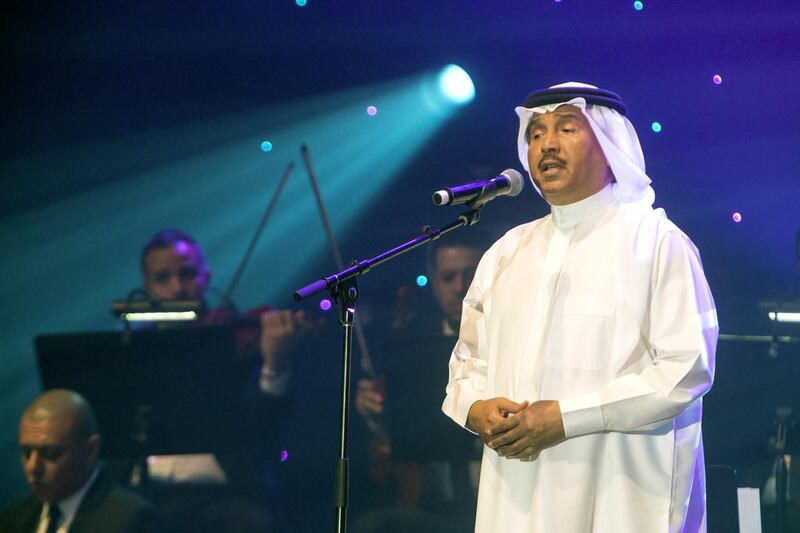The term legend has the habit of being bestowed liberally. When it comes to Mohamed Abdo, however, he is truly worth the declaration.
The veteran Saudi Arabian singer has demonstrated all the qualities required to cement such a title.
The 66-year-old played an influential role in introducing Khaleeji music’s distinctive rhythmic style to Arab audiences in the 1970s and 1980s – a time where regional pop hits were more orchestral affairs.
Since then, Abdo has remained a perennial draw, selling out arena shows and headlining festivals across the Middle East.
“There is a still a hunger for these songs,” he says modestly, before his show at Abu Dhabi’s du Forum on Saturday.
“It is very gratifying that, generally, people are still interested in the old style of Khaleeji music, with its poetry and traditions.”
Abdo is also a local legend here in the UAE, having been one of the first artists to tour the country in the early 1970s as guest of its founder, Sheikh Zayed.
“It was the early days when the country was founded,” he says.
“I remember the late, great Sheikh Zayed would always provide encouragement to us artists and was a big supporter of live music. Every month, he would organise one or two concerts for the people. He did this because he wanted to cultivate a sense of appreciation for music and culture very early. You can see the results of that today, in the following generations where there is now a very healthy arts-and-culture scene here in the UAE.”
Abdo does not necessarily share the view that he played a pioneering role in introducing Gulf music to the rest of the Arab world.
The genre is not totally foreign, he says, arguing it is actually born from the great tradition of Arabic classical music and poetry.
“The Khaleeji song has taken a special place in the hearts of people who live in the Arab world and the diaspora,” he says.
“The style may have sounded new to some ears, but if you look at it more closely, Khaleeji music was born out of the music traditions from Egypt and the Sham [the Levant]. So it is also familiar at the same time.”
Discussion with Abdo is not only limited to the past. The singer remains a presence on the modern scene with his steady release of digital singles, the most current of which is Heb w Jrah (translated to Love and Pain).
The Khaleeji pop track shows Abdo is not averse to updating his sounds with modern touches, including some synths and – particularly in the intro – a few cheeky funk guitar effects.
That said, it nevertheless remains an Abdo song courtesy of that agile voice that is able to discover new nuances in old subjects.
The accompanying video clip is only the fourth of his career and the UAE has been given the coveted slot of a shooting location. Other clips were filmed in serene international spots, including Turkey.
“We chose the UAE and Dubai because I wanted it to have an Arab feel this time, to match the style of the song,” he says. “I am pleased in that the song and the clip was well received by the fans.”
Those hoping the track’s success will spell a new album, the first in more than six years, should not hold their breath.
Abdo has no plans of releasing a new collection any time soon.
“I prefer to keep working on releasing singles,” he explains. “The way the industry is today, the single has such an effect that I am not even thinking about recording a new album.”
[ sasaeed@thenational.ae ]






